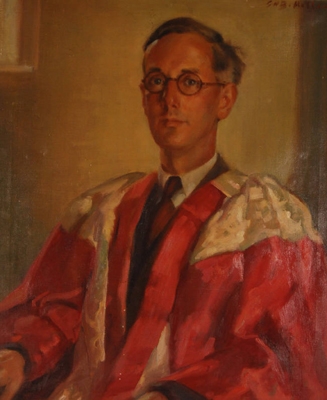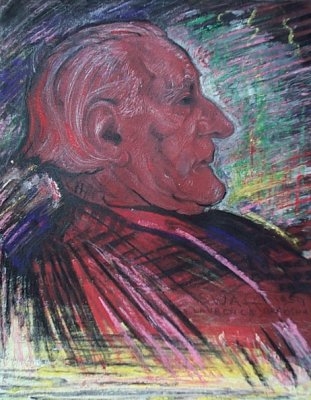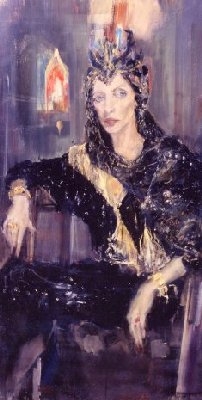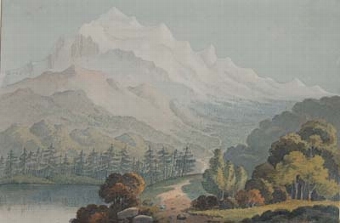featured item
portrait of professor sir jack westrup (1904-1975) - heather professor of music
- View other items in:
- antiques interior design modern and vintage
- other interior design
artware ltd
Enquire about this antique
Artware Ltd has 565 antiques for sale.
click here to see them all
Education Alleyn''s School, Dulwich, Balliol College, Oxford
Death At his home in Headley, Hampshire
Spouse Solweig Maria (died 1984), daughter of Per Johan Gustaf R?sell
Sir Jack Allan Westrup, 1904-1975, musician, author, and conductor, was born in Dulwich, London, 26 July 1904, the second of the three sons (there were no daughters) of George Westrup, insurance clerk, of Dulwich, and his wife, Harriet Sophia Allan. He was educated at Alleyn''s School, Dulwich, where he was a scholar, and then gained a Nettleship scholarship in music to Balliol College, Oxford. There was no honours degree in music at that time, so he first read classics in which he gained first class honours in moderations (1924) and second class honours in literae humaniores (1926) before proceeding to the B.Mus. degree in 1926. He took an active part in music in the university both as a keyboard and brass player. However, his most important contribution to Oxford music was his part in the foundation of the University Opera Club whilst still an undergraduate to which he returned later as conductor, when he was elected to the Heather professorship in 1947.In spite of a research grant on going down from Oxford when he worked on ?No?ls Proven?aux? in Avignon appointments for musical scholars were then so scarce that he went back to his old school and taught classics.
Jack Westrup was an assistant classics master at Dulwich College from 1928 to 1934.Then in 1934 he returned to music as a critic on the Daily Telegraph until the war virtually put an end to concerts in London, whereupon he did another short stint as a schoolmaster. From 1933 to 1945 also editor of the Monthly Musical Record. He gave classes at the Royal Academy of Music in London in 1938-1940. His chance to enter academic life came in 1941 when he was offered and accepted a lectureship at King''s College, Newcastle upon Tyne, and this was followed by his election to the Peyton and Barber chair of music at Birmingham University in 1944. He flourished at Birmingham, making full use of the excellent facilities offered by the Barber Institute library, and the opportunities for conducting.
He was lecturer at Wadham College, Oxford (1947-1971). Oxford conferred upon him the degree of honorary D.Mus. in 1944, and in 1947 he returned to his old university as Heather professor of music. Much as this pleased him, it was not an easy time for him, as there were some Oxford musicians who did not welcome his election. In 1947 he was named chairman of the editorial board of The New Oxford History of Music. In 1959 he succeeded Eric Blom as editor of Music & Letters. From 1958 to 1963 he was president of the Royal Musical Association. He was also active as a conductor; he conducted the Oxford Opera Club (1947-1962), the Oxford University Orchestra (1954-1963), and the Oxford Bach Choir and Oxford Orchestra Society (1970-1971). He was knighted in 1961. However, in 1950 the university finally allowed music to become an honours course and Westrup was mainly instrumental in designing a new syllabus which demanded a wider knowledge of musical scholarship than the old B.Mus. This gave him satisfaction and confidence. His energy was remarkable. Not only did he fulfil meticulously his duties as professor, but during his twenty-four years at Oxford he conducted seventeen operas for the University Opera Club mostly unfamiliar and including one first performance and one British premi?re, edited Music & Letters from 1959 and was president of the Royal Musical Association (1958-63), the Incorporated Society of Musicians (1963), and the Royal College of Organists (1964-6).
As a man Westrup was a person with complete self-control and with a presence which alarmed those who did not know him well. He did not suffer fools gladly and had no patience with the yes-man. If one disagreed with him his face would light up and his interest immediately would be stimulated. In matters of detail he was most meticulous and expected others to be likewise. But to those who had the fortune to know him well he was a kind and humble man, never too busy to offer help and almost incapable of saying ?no? to the most mundane of requests. Apart from his university degrees he was a fellow of the British Academy (1954), the Royal College of Organists (1942), Trinity College, London (1946), the Royal College of Music (1961), and the Royal School of Church Music (1963). He was also honorary RAM (1960). For his services to music he was knighted in 1961.It was to the lasting regret of his friends and colleagues and a serious loss to music that while at Oxford his energies were not directed more towards the writing of books. It was hoped nay, assumed that he would follow up his outstanding books on Purcell (1937), Handel (1939), and An Introduction to Musical History (1955) with works of similar stature. Instead he indulged in much editing (in 1947 he became chairman of the editorial board of The New Oxford History of Music), writing articles, compiling lexicons, and lecturing abroad which, although of importance, were no substitute for what a man of his talent should have achieved.
His versatility as a practical musician and as a musicologist can best be summed up by two quotations from his 1945 Deneke lecture (published in 1946): ?Nothing can better aid our endeavours than performance performance not merely by amateurs, to whose enthusiasm we so often owe a lively acquaintance with the past, but by expert musicians who unite with their skill an understanding of what they are trying to do.? And: ?Perhaps the virtue that we need most of all is humility not the crawling acquiescence that accepts great reputations and can find no flaw, but the readiness to believe in lesser men until we can prove them to be charlatans.? The last paragraph of this lecture might well have been written of him rather than by him: ?The great historians of music are those who have carried musical souls about them, who to industry and scholarship have added vision and found the power to share it with their readers.?In 1938 he married Solweig Maria (died 1984), daughter of Per Johan Gustaf R?sell, musical director of an infantry regiment in Link?ping, Sweden; they had one daughter and three sons. Westrup died at his home in Headley, Hampshire, 21 April 1975.
Jack Westrup prepared major revisions of Walker''s A History of Music in England (Oxford, 3rd edition, 1952) and of Fellowes''s English Cathedral Music (London, 5th edition, 1969); he also supervised revised editions of Blom''s Everyman''s Dictionary of Music (4th edition, 1962; 5th edition, 1971). He was co-editor, with F. Harrison, of the Collins Music Encyclopedia (London, 1959; American edition as The New College Encyclopedia of Music, New York, 1960).
Writings (all published in London unless otherwise given):
Purcell (1937; 4th edition, revised, 1980)
HandeI (1938)
Liszt (1940)
Sharps and Flats (1940)
British Music (1943; 3rd edition, 1949)
The Meaning of Musical History (1946)
An Introduction to Musical History (1955)
Music: Its Past and Its Present (Washington, D.C., 1964)
Bach Cantatas (1966)
Schubert Chamber Music (1969)
Musical Interpretation (1971)
George Herbert Buckingham Holland was born in Northampton, the son of a grocer. He studied at Leicester School of Art. He made his living painting portraits of Northampton dignitaries, but he also painted flowers, landscapes, town scenes and coastal scenes, mostly in oil. George Herbert Buckingham Holland (1901-1987) was born in Northampton. He was educated at Northampton Grammar School and trained as an artist at Northampton School of Art and Leicester College of Art (1918-23). In 1923 he opened a studio at Whitworth Chambers, George Row, Northampton. He lived in London for a while before returning in 1939 to Northampton, where he resided for the rest of his life.
He was primarily a portrait painter (three of his works are in the collection of the National Portrait Gallery) but he also painted landscapes and still life. A retrospective exhibition of his work was held in 1997 at the Central Museum and Art Gallery, Northampton, to mark the 10th anniversary of his death.
Antiques.co.uk Ref: MEE3CBCC
- Materials:
- Oil on Canvas
- Width (cm):
- 76.20 x 63.50 cm 30.00 x 25.00 ins
Artware Ltd
Artware Fine Art specialises in fine antique, decorative and historical portraits and topographical pictures . We cover a period from the 17th and 18th centuries through to the 19th & 20th Centuries. We have over 150 portraits in stock, which can be viewed on our web site, each historical portrait has well researched biographical information both on the sitter and the artist.
Contact details
18 La gare
51 Surrey row
London
Greater London
SE1 0BZ
UNITED KINGDOM
T: 0207 921 97904
E: greg@artwarefineart.com
W: www.artwarefineart.com












